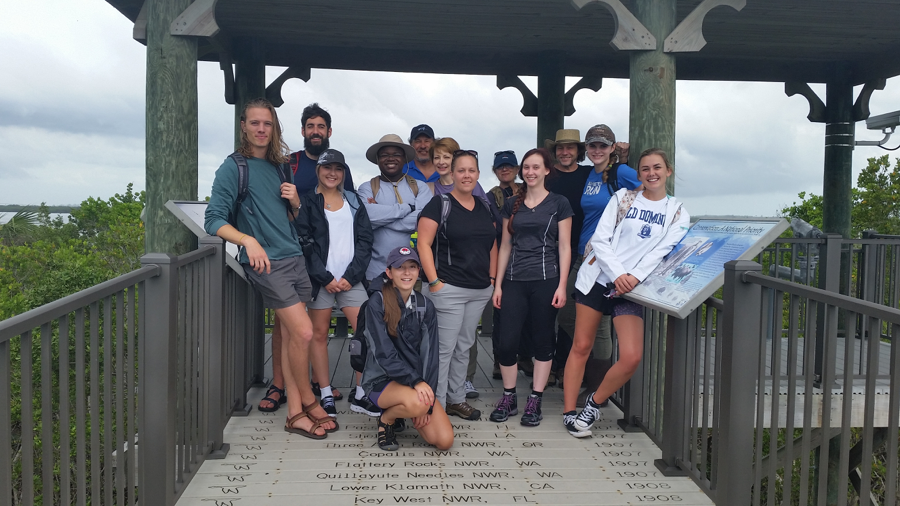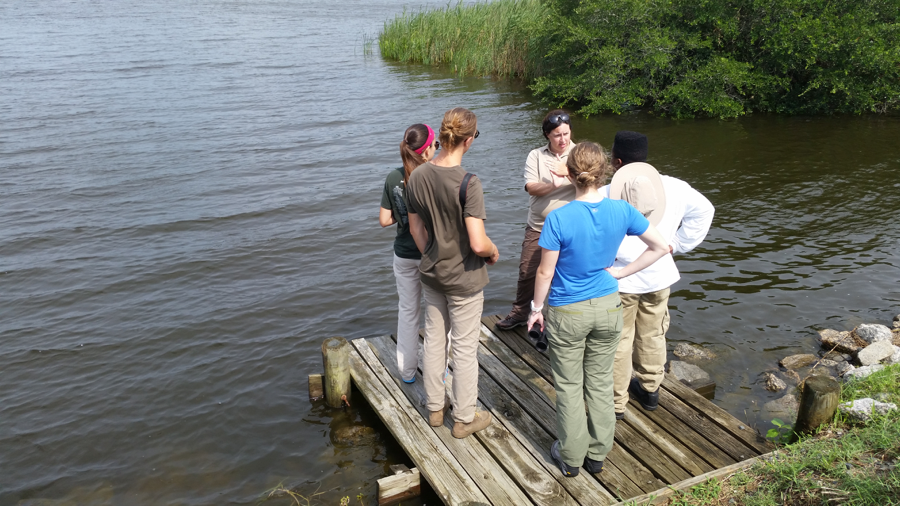U.S. Fish and Wildlife Service Partnership yield Conservation Leadership Opportunities
December 08, 2017
 Students, faculty and Fish and Wildlife staff pictured at an outlook in the Pelican Island National Wildlife Refuge.
Students, faculty and Fish and Wildlife staff pictured at an outlook in the Pelican Island National Wildlife Refuge.
 Interns are pictured at the Back Bay National Wildlife Refuge as they are introduced to the complex challenge of managing the water level to ensure its function as a refuge for migrating birds.
Interns are pictured at the Back Bay National Wildlife Refuge as they are introduced to the complex challenge of managing the water level to ensure its function as a refuge for migrating birds.
 Students take a sunset break on the beach.
Students take a sunset break on the beach.
The Mitigation and Adaptation Research Institute (MARI) at Old Dominion University (ODU) has partnered the U.S. Fish and Wildlife Service (FWS) to develop educational programs for conservation leadership focusing on adaptation to climate change and sea level rise.
As a first step, an interdisciplinary Minor in Conservation Leadership was established in 2016. This unique minor blends multiple high-impact practices such as field-based research, internship, and service learning. The minor requires two mandatory core courses, and internship and two electives. The first core course is the writing intensive IDS 466 "Mitigation and Adaptation Studies," which introduces students to studies focused on mitigation of human-induced changes in the Earth system, including climate change and sea level rise and adaptation to the impacts of these changes. In this class, the students work on real-world problems impacting FWS lands.
The second core course, IDS 467 "Sustainability Leadership," is a service-learning class. In coordination with the FWS, students carry out research projects at FWS facilities as part of the course work.
Last summer, 10 students and three faculty members from different departments worked for a week in Florida near the Pelican Island National Wildlife Refuge as part of the IDS 467 service learning course. Pelican Island is the first National Wildlife Refuge established in the United States in 1903 by President Theodore Roosevelt.
There, students carried out real-world problems related to the impacts of sea level rise and climate change on the coastal ecosystems on Pelican Island and its surrounding.
"Our trip to Florida working with US Fish and Wildlife was an unforgettable experience I would have never gotten to be a part of it if I hadn't been a conservation leadership minor,"said ODU Junior Karlie Pritchard.
Biology major Kahlil Scribner said the service learning project in Florida was a "deeply enriching" experience as students applied sustainability science and leadership skills learned in the classroom to a real world issue.
"We had the opportunity to collaborate with one another and the staff at Pelican Island National Wildlife Refuge to look at various trends and scenarios concerning habitat migration, species decline, and climate profiles to come up with potential solutions or responses to these issues in the context of sustainable development," Scribner said.
Supervised internships were also established for students to earn academic credits as part of the minor program. The first cohort of students completed their internships in the summer of 2017 at the Great Dismal Swamp National Wildlife Refuge and the Back Bay National Wildlife Refuge in Virginia and the Uvalde National Fish Hatchery in Texas.
The internship is one of multiple high-impact practices of the new minor that exposed students to insights of the workings of federal agencies and focuses on conservation problems.
Working with Hans-Peter Plag, MARI director and professor of ocean, Earth and atmospheric sciences, Eddie Hill, an assistant professor in ODU's Park, Recreation & Tourism Studies program, has managed the internship placements of students to ensure the best possible fit of with students' interests and potentials.
"The experience I gained while interning with U.S. Fish & Wildlife was fundamental to my growth as a scholar and as a developing steward of the natural environment because I got to work closely with an institution that cares deeply for wildlife and the wellbeing of the life support system of the Earth as a whole, "Scribner said. "I gained great insight and appreciation of the nature of the relationship between U.S. Fish & Wildlife, non-governmental agencies, and the public and how they all work together to help maintain the integrity of the natural environment."
Collectively, this new minor in conservation leadership facilitates the development of the next generation of conservation professionals with the goal to enable them to address conservation from a leadership perspective under changing climate and rising sea levels in a dynamic societal environment. Leadership in conservation is particularly challenged by the need to review underlying paradigms and to initiate paradigm shifts where needed.
Tatyana Lobova, a senior lecturer in the Department of Biological Sciences and the coordinator of the minor, said the academic program's coursework was specifically designed to bring together specialists and knowledge from different disciplines across campus to facilitate the system thinking of the students from different majors.
"This generation will face the consequences of local and global environmental problems that our society has never experienced before and they have to be prepared to address them," Lobova said.
Plag pointed out that working with students in the minor has been rewarding.
"Students researching real-world problems in conservation and having to come up with options to address these wicked problems opens up their perspective to a whole new level," he said.
Denise Sheehan, U.S. Fish and Wildlife Service's assistant director for budget, planning and human services, said it has been an exciting and rewarding experience to include students from Old Dominion in the day-to-day conservation work of the service.
"We take great pride in knowing that students come away from their time with us having gained real world conservation experience," Sheehan said. "The work they have provided has real value and we are grateful to this generation of students for their ambition to become the leaders of tomorrow."
The next step in the project, currently under way, is the development of conservation curricula for certificates at graduate and continuing education levels, including a sustainability leadership certificate. The development of these certificates in collaboration with the FWS is in progress and the certificates will also include the same high-impact practices as the minor. The project also assists the FWS in recruiting students for employment opportunities that provide practical work experience in conservation biology and knowledge of administrative support functions.

